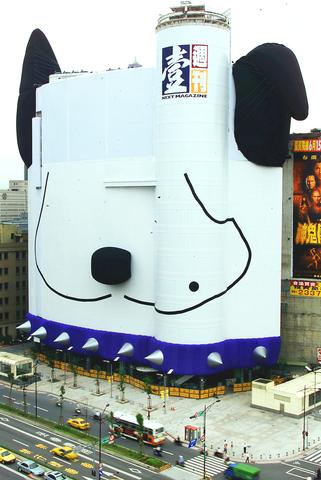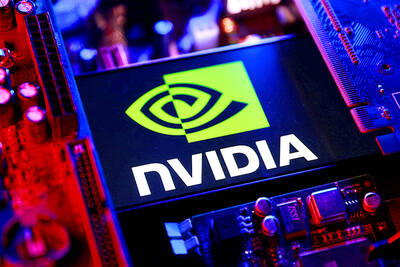The launch of Chinese-language Next Magazine (
Next Magazine is expected to spend NT$120 million (US$3.6 million) on a four-week advertising blitz for the tabloid-style magazine's launch.

PHOTO: REUTERS
But the competition -- China Times Weekly (
"We already knew last October that Next Magazine would launch its Taiwan edition when some of our advertisers approached us and discussed the issue," said a China Times official surnamed Lin, who refused to be further identified.
Lin confidently questioned the Taipei Times, "Have you heard of China Times Weekly? I think most people in Taiwan know who we are but few of them are aware of Next Magazine."
But maybe a 17-storey building shaped like a dog's head will get their attention. The company's headquarter's has done just that in the center of Taipei's movie district.
Lin added that the China Times was not interested in competing with Next's big ad budget.
"We don't think it is necessary for us to spend that much money to increase public awareness about us," Lin said.
The magazine's boss -- flamboyant publishing magnate Jimmy Lai (
"Controversial stories will sell, but controversy doesn't mean it's libel," said 52-year-old Lai, who moved to Taiwan from Hong Kong where he started Next Magazine.
Known for his clashes with Beijing, Lai plans to launch Next's Taiwan edition today with a targeted circulation of 250,000, which would make it the country's best-selling weekly magazine.
The China Times was skeptical about the sustained sales of the magazine at that volume.
"We don't think the Next's 250,000 target is feasible in the long run. They may distribute that many magazines during the first few weeks but I doubt how long they can sustain that circulation because it would be too costly," Lin said.
But one of the three publishing firms contracted to print Next's Taiwan edition confirmed to the Taipei Times the numbers were for real.
"They are printing 250,000, of which we are responsible for 40,000 copies," said a printing firm official who requested anonymity. The same firm also prints for rival rags the China Times Weekly and TVBS Weekly.
According to the printer, TVBS Weekly also started out with big dreams, but later downsized to match market demand.
"When the TVBS Weekly was first introduced about three years ago, they put about 200,000 copies into circulation, but now they put about 120,000 to 130,000 per issue," the printer said.
While Taiwan has its share of gossip magazines, Lai brings with him Next's aggressive style of shocking readers with glossy, revealing photographs of celebrities' private lives while his local rivals rely mostly on text and newsprint.
"I want the pictures to deliver as much information as possible," he said.
Lai hopes Taiwan's raucous, freewheeling democracy will prove fertile ground for his style of journalism.
"It's very exciting to live in a democracy. It's too tempting," Lai said when asked why he officially changed his residence to Taiwan last December.
"Democracy is irresistible. And this country is gonna open, is gonna undergo a great change and great change means great opportunity," said Lai, casually dressed in jeans by Giordano, a fashion chain he founded.
It was Lai's outspoken criticism of Beijing that led him to sell his stake in Giordano and relinquish the chairman's seat.
His Hong Kong-based Apple Daily (
Lai said Hong Kong's Next will serve as a base to enter China's southern Cantonese-speaking media market once the doors are opened, while the Taiwan edition will target the Mandarin-speaking north.
"Taiwan is definitely a strong catalyst to induce China going forward to its political restructuring to democracy," Lai said.
His Hong Kong-based Next Media (壹傳媒) has invested NT$500 million into the magazine's Taiwan edition, which will feature news on politics, the economy, entertainment and lifestyles.
It will sell for NT$75 a copy and Lai hopes to break even in two years.
He has hired about half of the 300 reporters laid off by Taiwan's online newspaper Tomorrow Times (

POWERING UP: PSUs for AI servers made up about 50% of Delta’s total server PSU revenue during the first three quarters of last year, the company said Power supply and electronic components maker Delta Electronics Inc (台達電) reported record-high revenue of NT$161.61 billion (US$5.11 billion) for last quarter and said it remains positive about this quarter. Last quarter’s figure was up 7.6 percent from the previous quarter and 41.51 percent higher than a year earlier, and largely in line with Yuanta Securities Investment Consulting Co’s (元大投顧) forecast of NT$160 billion. Delta’s annual revenue last year rose 31.76 percent year-on-year to NT$554.89 billion, also a record high for the company. Its strong performance reflected continued demand for high-performance power solutions and advanced liquid-cooling products used in artificial intelligence (AI) data centers,

SIZE MATTERS: TSMC started phasing out 8-inch wafer production last year, while Samsung is more aggressively retiring 8-inch capacity, TrendForce said Chipmakers are expected to raise prices of 8-inch wafers by up to 20 percent this year on concern over supply constraints as major contract chipmakers Taiwan Semiconductor Manufacturing Co (TSMC, 台積電) and Samsung Electronics Co gradually retire less advanced wafer capacity, TrendForce Corp (集邦科技) said yesterday. It is the first significant across-the-board price hike since a global semiconductor correction in 2023, the Taipei-based market researcher said in a report. Global 8-inch wafer capacity slid 0.3 percent year-on-year last year, although 8-inch wafer prices still hovered at relatively stable levels throughout the year, TrendForce said. The downward trend is expected to continue this year,

‘BASICALLY A BAN’: Sources said the wording governing H200 imports from officials was severe, but added that the regulations might change if the situation evolves Chinese customs authorities told customs agents this week that Nvidia Corp’s H200 artificial intelligence (AI) chips are not permitted to enter China, three people briefed on the matter said. Chinese government officials also summoned domestic technology companies to meetings on Tuesday, at which they were explicitly instructed not to purchase the chips unless necessary, two of the people and a third source said. “The wording from the officials is so severe that it is basically a ban for now, though this might change in the future should things evolve,” one of the people said. The H200, Nvidia’s second-most powerful AI chip, is one

A proposed billionaires’ tax in California has ignited a political uproar in Silicon Valley, with tech titans threatening to leave the state while California Governor Gavin Newsom of the Democratic Party maneuvers to defeat a levy that he fears would lead to an exodus of wealth. A technology mecca, California has more billionaires than any other US state — a few hundred, by some estimates. About half its personal income tax revenue, a financial backbone in the nearly US$350 billion budget, comes from the top 1 percent of earners. A large healthcare union is attempting to place a proposal before